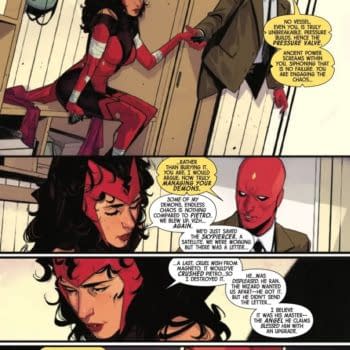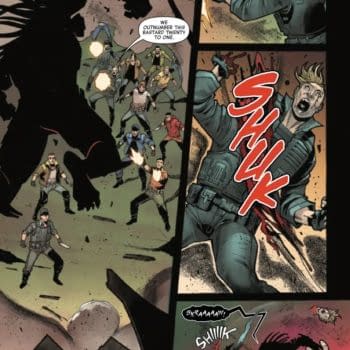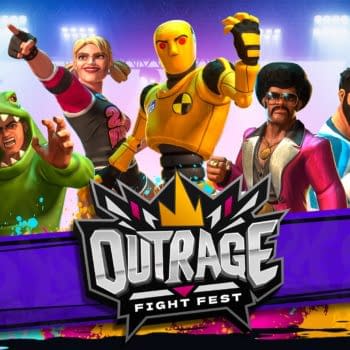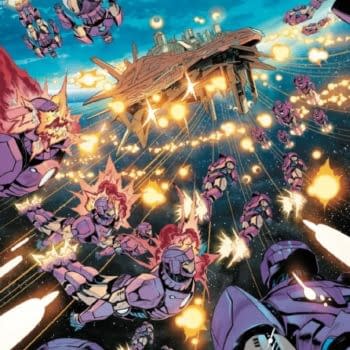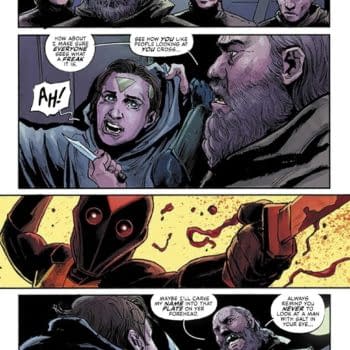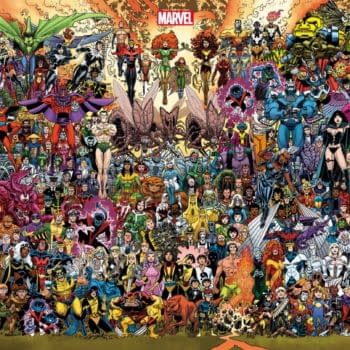Posted in: Comics | Tagged: Bryan Hill, Comics, entertainment, matt hawkins, postal, top cow
Going Postal With Bryan Hill Part 1
You might know Bryan Hill as the co-writer for the Top Cow series Postal along with Matt Hawkins and Isaac Goodhart. Recently Bryan was involved in two announcements: he would be writing Postal solo starting with the third story arc and that he had been hire by Top Cow as an editor. I sat down with Bryan to discuss the changes and ended up with quite an interview… one that will be posted in three parts this week and we'll also cover his upcoming new series Romulus.

for Top Cow's Postal and recently got hired on as an editor. How did you
get involved with Top Cow in the first place?
BRYAN HILL: I was living in NYC, screenwriting, and roomating with penciler Nelson Blake II. He introduced me to Rob Levin years ago and Rob was working with Matt at the time. Rob saw some sample pages of a comic project I was working on with Nelson, pages I wrote and he asked me if I wanted to do a short story in the WITCHBLADE universe, so that was my first comic gig. Matt (Hawkins) is open minded and I was lucky to find a company like Top Cow that was willing to break a new voice.
It's a cliche to say relationships matter, but they really do. For people reading this who want to know how to "break in," the thing to keep in mind is that work gets you in, online comics, sample stories, anything that shows your perspective and talent as a storyteller will get you one step closer to getting published. You just have to write and for a while it feels like screaming into the wind, and it may be, but if you keep screaming someone will hear you. I've been working in comics for ten years and most of it has been grinding. Grinding is the discipline, but if you stick with it and ignore everyone who tells you that it won't work out — and sometimes that's everyone in your life — you will get there.
DW: And how did living in NYC and doing a Witchblade become living in LA and
writing and editing for the company?
BH: LA is a recent thing for me, the last four years. I grew up in Saint Louis and that's no place to be different so when I attended NYU I fell in love with the city and the way you can continually reinvent yourself, challenge yourself, and no matter what strange shit you're obsessed with, you can find a group of people interested in the same thing.
Writing led me to chasing experiences. My heroes growing up were Hemingway and Faulkner. Vidal. Chester Himes. They were writers but they lived at full volume, lives more intense and they reported from the front lines of the life they lived. So I stayed in NYC – and did a lot of things that we're pretty irresponsible and self-destructive – until screenwriting pulled me out to LA. I had written a Dolph Lundgren movie (THE MECHANIK), but that didn't really open doors. I sold a script to Universal and that brought me to LA, and that's where I got to know Matt.
Here's the thing about Matt Hawkins. He's a straightforward fella, and in entertainment that's rare. He tells you what he thinks and you don't worry about where you stand. I respect that and that's when I really became interested in working with him. From there it was a series of coffees and conversations about comics. I did a PILOT SEASON project called SEVEN DAYS FROM HELL that was well received and that gave me the confidence to continue in comics. I've always loved comics, but it's a hard, hard professional culture to get into, your love gets you into the stadium but it's attrition that gets you onto the field. So when Top Cow took that first risk, when Top Cow chose to believe in my ability to write comics, that meant a lot to me and I wanted to build work there.
Matt asked me if I wanted to co-write POSTAL with him and I thought it would be incredibly difficult to execute, but that excited me. I like challenges. I like adversity. I like pushing myself to see what happens. I came back to him with some ideas, he liked them and we started working.

A lot of writers don't seek to help other writers. They're worried about scarcity…or something. If I help her, then I risk losing what I have. I don't know. I've been shot at a few times so I have a different scale of things to be afraid of in life. I've had a lot of people knock me down when I needed a hand up so when given an opportunity to work with people on stories, I took it. I love writers and seeing the world through their eyes, seeing what matters to them. I'm fighting the same battles, trying to get my story from a blank page to something worth spending money and time on in a world where a lot of things ask people for money and time. If I can help people through that process, that helps me through mine.
DW: I think all the best writers have been shot at or at least had a gun pulled on them… So Postal was already a concept when you came on board? How close was it to what we ended up with in the first issue? What was it about the concept that drew you in beside Matt asking?
BH: Matt had already worked out the concept. I suggested tweaking some character dynamics and using tonal reference like Cormac McCarthy and Capote's IN COLD BLOOD. The first issue really came out in conversation with Matt over coffee. We just hammered out the beats at the table and then went straight into scripting. Once character dynamics are in place, stories come fast. You have a world. You have people in that world who want things, people who make choices; the choices people make create story dynamics. Character first is how I always find a way into anything.
I was drawn to it because I grew up in Saint Louis, but I have family in the smaller towns of Missouri, the places that have their own isolated culture, places that don't want involvement or awareness of outsiders. I related to those aspects of POSTAL. I also found Mark, and his psychological spectrum interesting. There are a lot of people on the Asperger's spectrum and usually those characters wind up being cliches in fiction, gimmick characters that solve the crime by the end of the story arc and that's reductive. Mark in POSTAL was an opportunity to go deeper than that and explore a character with a non-traditional psychological perspective with more dimension.
It's also a place where I can confront the darkness we all share. It's a story about people who live in the abyss, trying to make the abyss a decent, or at least a manageable place. I'm a writer to confront things, to take readers with me on that path of confrontation. POSTAL allows me to do that.
DW: For anyone who is new to POSTAL, you talked about Mark and his Asperger's, but the world around him is unique as well. Can you explain the set up for someone who is jumping into the series or who may be curious to go back and grab that first trade?
BH: Sure. Dan. POSTAL is about a small town, populated by criminals, some fugitives and some not, that's run by a draconian Mayor who's constantly working to keep the damn place from tearing itself apart. We see the story through the eyes of Mark Shiffron, the Mayor's son and the postman of the town. A fella with Asperger's, Mark sees this world with a blistering clarity, a clarity that also speaks to the darkest aspects of human nature. It's a story about mystery, tragedy, violence and justice. Matt lovingly describes it as TWIN PEAKS meets TRUE DETECTIVE. That's pretty accurate.

When I grew up reading comics in the 1980's, comics took incredible risks. They were DANGEROUS. Comics asked if vigilantism could be justified. They asked if revenge was justice. They created incredible, challenging, fierce women (unfortunately too often from male writers, don't yell at me Gail Simone, I understand the context). Comics woke me up to the power of popular fiction and I became instantly passionate about the form.
Comics, in my formative years, we're a fucking bloodsport. They excited you and scarred you and you walked away changed by every issue.
When you take powerful ideas and you back them up with powerful art, you are, in short, creating philosophical propaganda. I still believe that great power must be met with greater responsibility. I still believe that (some) criminals are a superstitious and cowardly lot. I still believe in truth, and justice and the potential of the American Way.
POSTAL, hopefully, maintains that tradition of creating fiction that challenges. It challenges me as a writer. The penciler, Isaac Goodheart is one of the most exciting new artists in the world of comics, in my opinion.
It's a worthy book about unworthy people taking the long, twisting, blood-stained road to redemption.
On Wednesday I will post the second part of this interview.









